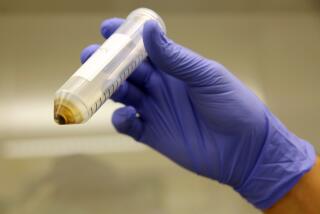300,000 West Virginians told not to use water after chemical spill
- Share via
CHARLESTON, W.Va. — Hundreds of thousands of West Virginia residents have been left dry with no idea when they will be able to again trust the water from their taps after a chemical used in the processing of coal spilled into a river.
As state and federal agencies rushed emergency water supplies to nine stricken counties, officials were promising to investigate how the chemical, 4-methylcyclohexane methanol, spilled into the Elk River. It flowed into a water treatment facility about 1.5 miles away, and officials worried it could have polluted water eventually sent to about 300,000 residents.
People have been told not to drink the water or use it for cleaning. The only exception: flushing toilets.
“At this time, I do not know how long this will last,” Democratic Gov. Earl Ray Tomblin said at a news conference Friday, adding later, “This discharge of pollutants is unacceptable.”
“We don’t know the water is not safe, but I can’t say that it is safe,” said Jeff McIntyre, president of West Virginia American Water Co.
McIntyre said his company, which supplies water to other companies that distribute it, would have to flush out miles of service lines to make sure all is safe.
The spill prompted schools to close, and stores quickly ran out of bottled water and other drinks. Downtown Charleston, normally packed with Friday night customers at restaurants and bars, was dark and quiet. A faint chemical odor lingered on the streets.
The Holiday Inn on 2nd Avenue remained open, but Miranda Burkamer and other employees spent the day phoning customers to warn them that the hotel’s water and ice was unusable and that the restaurant was closed. Almost 70 guests canceled, Burkamer said.
President Obama issued a federal disaster declaration for the state on Friday, and the Federal Emergency Management Agency and other emergency teams began transporting water to the region. A FEMA convoy of 75 trucks carrying 18,500 liters of water was in the area.
In the parking lot of a former industrial plant on Charleston’s western edge, emergency officials were distributing water from a tanker towed by a dump truck. A long line of residents toting buckets, pitchers and bottles formed in the dark. Some waited an hour.
“My office and other federal law enforcement authorities have opened an investigation into the circumstances surrounding the release,” U.S. Atty. Booth Goodwin said in a statement. “We will determine what caused it and take whatever action is appropriate based on the evidence we uncover.”
The “release of a potentially dangerous chemical into our water supply has put hundreds of thousands of West Virginians at risk, severely disrupted our region’s economy, and upended people’s daily lives,” Goodwin said.
The crisis began Thursday when 4-methylcyclohexane methanol leaked into the Elk River from a storage tank at the Freedom Industries facility in Charleston. The storage tank can hold more than 40,000 gallons. Officials said it appeared that 2,000 to 5,000 gallons spilled into the river.
Freedom Industries President Gary Southern said in a statement that the company would work with all authorities to deal with the incident.
No injuries have been reported from the chemical, which can be harmful if ingested, but Tomblin asked residents to check on each other. “If you — or anyone you know — experiences symptoms including nausea, vomiting, dizziness, irritation of the eyes and skin, seek care immediately,” he said.
As residents waited in line at a water tanker in Charleston, some complained about a lack of personal hygiene — and about having to use precious bottled water to wash faces, brush teeth and wash dishes.
“I haven’t had a shower in two days,” Dave Bays, 42, announced to the gathering as he waited in line, holding two new black plastic oil containers he said he had bought at an auto parts store because all ordinary water containers had sold out across the city.
“Nobody here has had a shower,” Bill Judy, 58, a state government worker, said with a laugh. Judy had bought four plastic storage bowls with lids, which he hoped would hold enough water to get him through another day.
Asked how he’d been faring at home with no potable water, Judy replied: “Peanut butter and jelly sandwiches and plenty of Gatorade.”
Hayward Tryee, 48, a street department worker, brought two big plastic jugs and two small plastic bottles. The worst part, he said, is not knowing how long the emergency will last.
“It could be a while,” he said.
More to Read
Sign up for Essential California
The most important California stories and recommendations in your inbox every morning.
You may occasionally receive promotional content from the Los Angeles Times.















